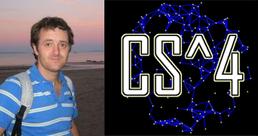Seminar 3rd June 2011 4 p.m. University of Southampton, Building 58 (Social Sciences) Room 1003
Modelling coevolution of bacteria and bacteriophage in marine microbial ecosystems
Dr Hywel Williams
College of Life and Environmental Sciences, University of Exeter
- Web page
- http://researchpages.net/people/hywel-williams/
- Categories
- Agents, Bioinformatics, Biomathematics, Complex Systems, Ecology, Evolution, Evolutionary Algorithms, Systems biology
- Submitter
- Petrina Butler
Complex Systems Simulation Seminar Series (CS^4)
from the Institute for Complex Systems Simulation, the Complexity in Real-World Contexts USRG, and the Computational Modelling Group.
Speaker
Dr Hywel Williams
http://researchpages.net/people/hywel-williams/
Abstract
Marine microbial ecosystems are complex adaptive systems in which higher-level processes (e.g. material/energetic flows) emerge from lower-level interactions of a huge diversity and abundance of organisms. A good example of this complexity is the interaction between bacteriophage (viruses that infect bacteria) and their unicellular hosts. Bacteria are of central importance in marine ecosystems, where they are responsible for a large proportion of primary production and nutrient cycling. Bacteriophage are a major cause of bacterial mortality and thereby also significantly influence ecosystem function, both directly through the material products of cell lysis and indirectly by their impacts on bacterial diversity and community structure. Here I present results from an evolutionary simulation model of bacteria and phage in an aquatic environment. The model represents individual bacteria and phage with simple "genomes" coding for phenotypic traits governing infection. Model validation is performed by comparison with empirically tested models of bacteria and phage in chemostats. Experiments show rapid coevolutionary diversification of simulated bacteria and phage, with associated impacts on community-level productivity and resource use. Metagenomic signatures of phage predation are observed in the simulated bacteria that match those seen in real marine bacteria, supporting a `constant diversity' theory of bacterial evolution.
Refreshments
Available from 3:30pm, lecture starts at 4pm.
Complex Systems Simulation Seminar Series
For the complete CS^4 schedule please click here: http://www.multidisciplinary.soton.ac.uk/cs4.html
Contact
Multidisciplinary Research Co-ordinator
University Strategic Research Groups
Research and Innovation Services
02380 593244
